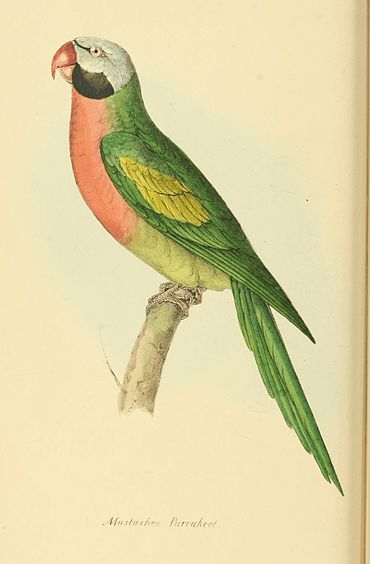Mustachoe Parrakeet.
The Ring-necked Parrakeets of India, and the Asiatic Islands, are now considered as forming a particular genus. The geographic distribution of the group, and the characters of the species, have been detailed with much skill and classic erudition, in the Zoological Journal.
PALEORNIS Pondicerianus.
Pondichery, or Mustachoe Parrakeet.
Family Psittacidæ.
Generic Character.—Zool. Journ. 2, p. 46.—Less. Man. 2, p. 145.
Specific Character.
Green; head pale bluish; frontal line and stripe on the lower jaw black; wings with a central spot of yellowish; breast pale red.
Le Perruche a moustaches. Buffon. Sonn. 27, p. 185, Pl. Enl. 517.
—— a poitrine rose. Levail. Pl. 31.
P. Pondicerianus. Kuhl, Nova Acta, &c. No. 48*.
Paleornis Pondicerianus. Vigors. Zool. Journ. 2, p. 54.
Among the numerous ornithological facts, which the distinguished liberality of MM. Cuvier and Geoffroy St. Hilaire enabled us to ascertain, during a course of study at the Royal Museum of Paris, is one that relates to this species. Specimens in that noble collection, both from Pondichery and Java, enable us to affirm, that the Psittacus Osbeckii and Pondicerianus of authors, are one and the same species.
Notwithstanding the frequency of this bird in Java, and other parts of India, we are completely ignorant of its natural history, of those diversified habits, and modes of living,—in short, of that knowledge, which gives such an animating charm to natural history, which manifests the provision of the Almighty for all His creatures, which can be known and understood by all, and which prompts the heart to contemplation and praise. Is there no one, in all our vast Oriental territory, to record something of the feathered inhabitants of the Eastern World? Is there not, throughout India, even one of our countrymen, imbued with the spirit of a Wilson, a Levaillant, or an Audubon?
